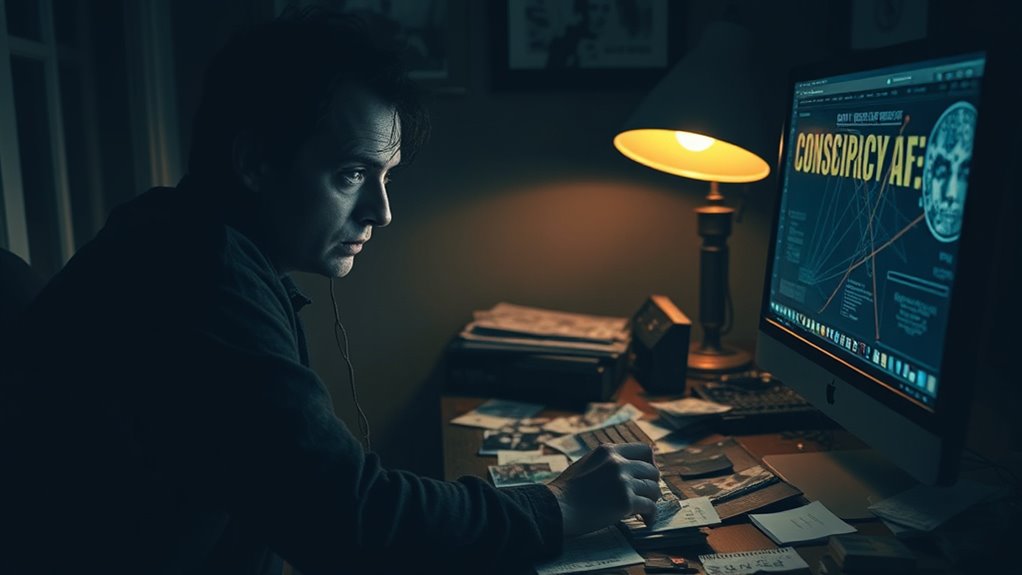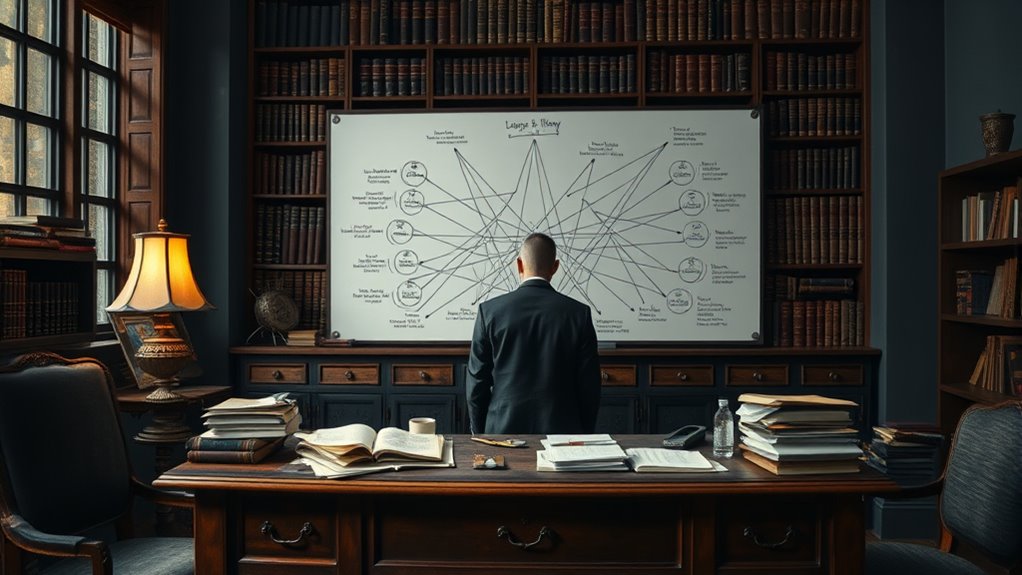Your belief in conspiracy theories often stems from early experiences of distrust, cultural influences, and emotional needs for certainty and belonging. Cognitive biases like confirmation bias and pattern recognition make it easy to see hidden connections. Media, social groups, and authority figures also shape what you accept as truth. Simplified explanations offer mental comfort, especially during uncertainty. To understand more about why people believe this way, keep exploring these psychological, social, and media influences.
Key Takeaways
- Early trust issues and cultural influences foster skepticism, making individuals prone to believing conspiracy theories for emotional comfort.
- Cognitive biases like confirmation bias and pattern recognition simplify complex issues, increasing susceptibility to conspiratorial thinking.
- Media algorithms and sensational content create echo chambers that reinforce existing beliefs and spread false narratives.
- Strong group loyalty and social identity encourage acceptance of conspiracy theories aligning with in-group narratives.
- Developing critical thinking skills and source evaluation helps counteract biases and reduces belief in conspiracy theories.
The Roots of Suspicion and Distrust

Suspicion and distrust often originate from early experiences where trust was broken or unmet expectations were not fulfilled. Historically, societies with tumultuous backgrounds—wars, political upheaval, or systemic oppression—shape collective skepticism. Cultural influences also play a vital role; for example, cultures emphasizing individualism may foster suspicion of authority, while communal societies might promote trust within the group. These historical and cultural contexts inform how you perceive institutions, authority figures, and even neighbors. When trust is repeatedly betrayed or expectations go unmet, you become more wary and cautious. Over time, this persistent wariness can develop into a general skepticism, laying the groundwork for conspiracy thinking. Additionally, data analysis by AI can reveal patterns of distrust and social dynamics that contribute to these beliefs. Understanding these roots helps explain why suspicion thrives in certain environments and among particular cultural groups.
Cognitive Biases That Favor Conspiracy Thinking

Cognitive biases play a significant role in shaping how people interpret information and often favor conspiracy thinking. Confirmation bias leads you to focus on evidence that supports your existing beliefs while dismissing contradictory facts. This makes you more likely to accept conspiracy theories that align with your worldview. Pattern recognition is another bias that influences you to see connections or hidden meanings where none exist, reinforcing your suspicions. When your mind perceives patterns, it creates a sense of order and control, even if those patterns are illusory. Additionally, the contrast effect can distort perceptions by making differences seem more significant than they are, further fueling conspiracy beliefs. Together, these biases make it easier for you to accept conspiracy theories, as they confirm your biases and help you find meaningful connections in randomness. Recognizing these biases is key to understanding why conspiracy thinking can feel so convincing.
The Role of Emotional Needs and Anxiety

You might find that believing in conspiracy theories provides emotional comfort during uncertain times. These beliefs can help reduce feelings of anxiety by offering clear explanations. When faced with uncertainty, seeking out such explanations becomes a way to regain a sense of control. Additionally, engaging with conspiracy theories can fulfill psychological needs for certainty and belonging.
Emotional Comfort in Beliefs
When anxiety and feelings of uncertainty take hold, many people turn to conspiracy theories as a source of emotional comfort. These beliefs provide emotional validation, making you feel understood and secure. Conspiracy theories reinforce your worldview, strengthening your sense of control amid chaos. They also offer belief reinforcement, affirming your instincts and suspicions. This emotional support reduces feelings of vulnerability and loneliness, giving you a sense of belonging. Additionally, privacy and data management policies can influence how personal information is collected and used, which may impact feelings of security and trust in online environments.
Anxiety and Uncertainty
Anxiety and uncertainty can quickly erode a sense of stability, leaving you feeling vulnerable and overwhelmed. Throughout history, periods of upheaval or crisis have heightened these feelings, fueling a desire for clear answers. Cultural influences also shape how you interpret threats and manage fear, often making conspiracy theories appealing during uncertain times. When the world feels unpredictable, your emotional needs for safety and control become more urgent. Conspiracy theories offer simple explanations that reduce anxiety by providing a sense of understanding and predictability. They tap into your need for certainty, especially when traditional sources of information seem unreliable or insufficient. Additionally, the Vetted – Halloween Product Reviews demonstrate that cultural expressions and collective narratives can influence beliefs, further reinforcing the allure of believing in explanations that ease emotional discomfort.
Social Identity and Group Dynamics

Your sense of belonging often depends on your loyalty to a group and how much you trust its members. When you identify strongly with a group, you may view outsiders with suspicion or bias. This in-group/out-group dynamic can reinforce conspiracy beliefs by creating us-versus-them mentalities. Additionally, the tendency to seek emotional support and affirmation within a group can further solidify these beliefs, especially when group members share collective narratives that validate their worldview.
Group Loyalty and Trust
Group loyalty and trust serve as fundamental drivers in the formation and persistence of conspiracy theories. When your moral alignment aligns with a group’s beliefs, you’re more likely to accept its narratives, even if they challenge mainstream views. Cultural identity also plays a key role; you may feel compelled to defend your community or shared values by endorsing theories that reinforce your group’s cohesion. Trust in group leaders or fellow members solidifies these beliefs, making you less receptive to alternative perspectives. This sense of loyalty creates a psychological safety net, encouraging you to prioritize group allegiance over external evidence. Ultimately, your commitment to your group’s moral stance and cultural identity fuels the belief in conspiracy theories that unify and protect your social identity. Additionally, a strong sense of self-understanding can influence how individuals interpret and engage with group narratives, shaping their susceptibility to conspiracy beliefs.
In-group/Out-group Bias
Loyalty to a group influences how you perceive and evaluate information, especially when it comes to distinguishing insiders from outsiders. In-group/out-group bias strengthens group cohesion, making you more likely to trust fellow members and dismiss outsiders’ perspectives. This bias fosters social conformity, as you align your beliefs with the group’s norms to maintain acceptance. You may unconsciously favor information that confirms your group’s views and reject evidence that challenges them. This dynamic heightens your commitment to the group’s narrative, even if it’s flawed or false. As a result, you become more susceptible to conspiracy theories that reinforce your group’s identity, creating an echo chamber where dissenting voices are marginalized and the in-group’s beliefs become reinforced. Additionally, understanding affiliate marketing disclosures can help you recognize how external influences may shape information you encounter, further impacting your trust and beliefs.
The Impact of Media and Information Ecosystems

Media and information ecosystems play a critical role in shaping how conspiracy theories spread and persist. In today’s landscape, you face constant information overload, which makes it harder to discern credible sources. Your media literacy skills become essential in steering through this environment. Consider these key impacts:
Media ecosystems influence conspiracy spread; media literacy is vital to navigate falsehoods and overload.
- Amplification of falsehoods: Social media algorithms prioritize sensational content, spreading conspiracy theories faster.
- Echo chambers: Algorithms create isolated worlds where your beliefs are reinforced without challenge.
- Information overload: The sheer volume of content can overwhelm you, leading to reliance on simplified narratives.
- Manipulation tactics: Misinformation campaigns exploit emotional triggers, making conspiracy theories more appealing.
- Additionally, the visual appeal of some content can increase its credibility and shareability, further entrenching false narratives.
Understanding these influences helps you critically evaluate information and resist unwarranted beliefs.
The Appeal of Simplified Explanations

When faced with complex issues, many people are naturally drawn to simplified explanations because they offer quick clarity and reduce cognitive effort. Simplified narratives make complicated problems seem straightforward, giving you a sense of understanding without needing to analyze every detail. These quick explanations provide a sense of control and certainty, especially during confusing or uncertain times. Conspiracy theories often present these simplified narratives, making them appealing by cutting through ambiguity. They allow you to grasp a “big picture” quickly, avoiding the mental fatigue of processing complex information. This need for mental ease explains why you might prefer simple stories over nuanced realities, especially when faced with overwhelming or conflicting information. Ultimately, simplified explanations satisfy your desire for quick answers and mental comfort. Additionally, the use of encryption solutions in cybersecurity can help secure sensitive information, reinforcing the importance of protecting oneself from misinformation.
How Authority and Power Influence Beliefs

Authority and power profoundly shape what people believe because they influence the information we trust and accept. Authority influence can lead you to accept claims without question, especially when they come from perceived figures of power. Power dynamics determine how information flows and what is deemed credible. When authority figures endorse a conspiracy, it increases its perceived legitimacy. Conversely, those in power can suppress or distort facts to maintain control. This creates a landscape where beliefs are shaped by who holds authority rather than evidence.
- Authority influence makes you more likely to trust official sources.
- Power dynamics can suppress dissenting views.
- Authority figures’ endorsements sway public perception.
- Power can distort or manipulate information for control.
Strategies for Critical Thinking and Skepticism

To navigate the influence of authority and power on beliefs, developing strong critical thinking skills is essential. Start with critical analysis by questioning assumptions, examining evidence, and considering alternative explanations. Use fact-checking techniques to verify claims—consult reputable sources, cross-reference information, and look for corroboration. Avoid accepting information at face value; instead, evaluate the credibility of sources and the logic behind arguments. Recognize cognitive biases that may skew your judgment, such as confirmation bias or emotional reasoning. Practice skepticism by asking yourself, “What’s the evidence?” and “Could there be another explanation?” These strategies help you assess information objectively, reducing susceptibility to misinformation and enabling more informed, rational decisions.
Frequently Asked Questions
How Do Childhood Experiences Influence Susceptibility to Conspiracy Beliefs?
Your childhood experiences shape how you view the world and your trust in others. If you grew up in unstable family dynamics or experienced childhood trauma, you might be more prone to believe conspiracy theories. These beliefs can offer a sense of control or explanation for chaos you faced early on. Your past influences your need for certainty, making you more susceptible to accepting suspicious or conspiratorial ideas.
Can Genetics Play a Role in Predisposition Toward Conspiracy Thinking?
Imagine you’re living in Victorian London, pondering whether genetic predispositions influence your beliefs. Research suggests that inherited traits can indeed shape how open you are to conspiracy thinking, with genetics playing a subtle role. Your genetic predispositions may make you more or less likely to accept suspicious claims, as they influence your cognitive tendencies and trust levels. While not deterministic, genetics can contribute to your susceptibility to conspiracy theories.
How Do Cultural Differences Affect the Propensity to Believe in Conspiracies?
Cultural differences shape how you perceive and interpret conspiracy theories, influencing your likelihood to believe them. Cross-cultural perceptions affect what’s considered credible or suspicious within your society. In some cultures, belief normalization occurs more easily due to shared narratives or distrust of authorities. You might find yourself more receptive to conspiracy ideas if your cultural context fosters skepticism or if similar beliefs are widespread, highlighting how culture molds your susceptibility.
What Neurological Factors Are Involved in Conspiracy Belief Formation?
You’re influenced by neural pathways and brain structures that shape your belief formation. When you encounter conspiracy theories, your amygdala activates, processing fear and threat, while the prefrontal cortex struggles to evaluate evidence critically. These neural pathways can reinforce beliefs by rewarding your brain’s desire for certainty and control. Understanding these neurological factors helps you see why your brain might favor conspiracy thinking, especially under stress or uncertainty.
How Do Conspiracy Theories Impact Real-World Decision-Making and Behavior?
Conspiracy theories influence your decision-making and behavior by shaping your social influence and risk perception. When you believe in a conspiracy, you might avoid certain activities or trust specific sources, impacting your choices. These theories can heighten your perception of risk, leading you to act defensively or suspiciously. As a result, your actions become aligned with the theories’ narratives, affecting your interactions and judgments in real-world situations.
Conclusion
Understanding why you believe in conspiracy theories helps you see the tangled web of doubts, biases, and emotions shaping your thoughts. By questioning your instincts and seeking facts like a lighthouse guides ships, you can navigate through misinformation’s fog. Remember, your mind’s a garden—tend it with curiosity and skepticism, and you’ll prevent weeds of falsehood from choking the truth. Empower yourself to see clearly beyond the shadows and find the light of understanding.









